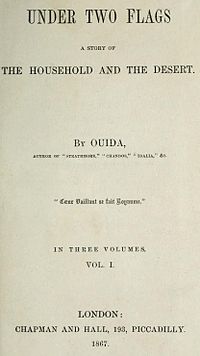
Under Two Flags by Ouida (Marie Louise Rame’) (Amazon Digital Services (Kindle version). ISBN B004NBYX28)
Like many boys who grew up in the 1950s and 1960s, I was an avid reader of Classics Illustrated comic books. The series attempted, fairly successfully, to convert beloved novels from the 19th and early 20th century into what we now call graphic novels. The condensed, illustrated format of Classics Illustrated introduced me to A Tale of Two Cities, Ivanhoe, Les Miserables, and Under Two Flags, a fairly forgotten and obscure novel of the French Foreign Legion by Marie Louis Rame’, an English novelist and contemporary of Dickens, who wrote under the nom de plume, Ouida. You can learn more about this prolific author (over 40 books) at: http://en.wikipedia.org/wiki/Ouida. But as all things Wiki, be advised I found a slight error in the narrative. The article claims that Under Two Flags “describes the British in Algeria.” That’s not accurate as you will learn below. Ouida has been called a writer of romantic/historic novels. With respect to Under Two Flags I would agree with the categorization.
The first half of the novel takes place in England, where we are introduced to Bertie Cecil, the illegitimate son of a British peer, whose tainted blood is a family secret. Secrets are a common thread throughout the plot of this lengthy, at times, cumbersome exercise of Victorian prose but, in most instances, the author conceals the truth from the reader with a fairly adept hand. At times, the wordy style (think a clumsy Henry James or Charles Dickens) gets in the way of a pretty fair story. Bertie’s fall, due to his gambling, his sense of honor, and his younger brother (who has learned all of Bertie’s less admirable qualities) is swift and extreme, sending the former playboy/cavalry soldier into hiding to avoid criminal prosecution as a forger and thief.
The blackguard fallen noble re-appears as a corporal in the French Foreign Legion posted in the deserts of Algeria where the indigenous peoples, sons and daughters of Mohammed, aren’t too keen on being part of France’s Second Empire under Napoleon III. Reinventing himself as the heroic common cavalryman, Louis Victor, Cecil flaunts death and leads his fellow soldiers into battle with acclaim only to have his superior officer (a Frenchman known unaffectionately as the Black Hawk who has guessed Cecil’s upper crust roots if not his identity) continuously discipline and belittle the former British officer. Rounding out the cast of characters is Rake, Cecil’s aide de camp who left England with the fallen man and the only person who knows Louis Victor’s past, and Cigarette, a half French/half African child of the army who adds not only comic relief to the tale but is a wickedly vicious unofficial soldier for her beloved France. Enigmatic and post-pubescent (though hardly mature) Cigarette saves Ouida’s novel from being a patterned parade of expendable Victorian characters. Diminutive in stature, unschooled but educated in the ways of men and the world beyond her tender years, Ouida conceals nothing of the inspiration behind this wonderful creature of fiction: There are multiple references in the story to others perceiving Cigarette as the second coming of Joan of Arc. The connection is not subtle but labeled as such by the author, making this reviewer believe that Ouida didn’t think her readers were well-read or smart enough to make the link on their own. Talking down to your audience is never a good thing for a writer to engage in and this sin is one that does, in the case of Under Two Flags, find itself repeated. Still, despite this flaw of faith on behalf of the author, there’s enough action in the second half of the book to interest male readers and enough romance to draw in, to use Ouida’s phrase, the “delicate sex”. As far as action goes, the ending is a bit too theatrical and implausible; not one of the better imaginings within the text. The horse racing scene in the English portion of the tale, along with the battle scene that sets up Louis Victor’s fate and Cigarette’s being honored by a Marshall of the Legion in the Algerian section, are well written. The desert battle scene in particular causes one to feel the searing Algerian sun and inhale the odors of sweat, horse, blood, and fear.
All in all, not a great book but a fairly good read. Especially since you can access it on Kindle for free!
3 and 1/2 stars out of 5.


